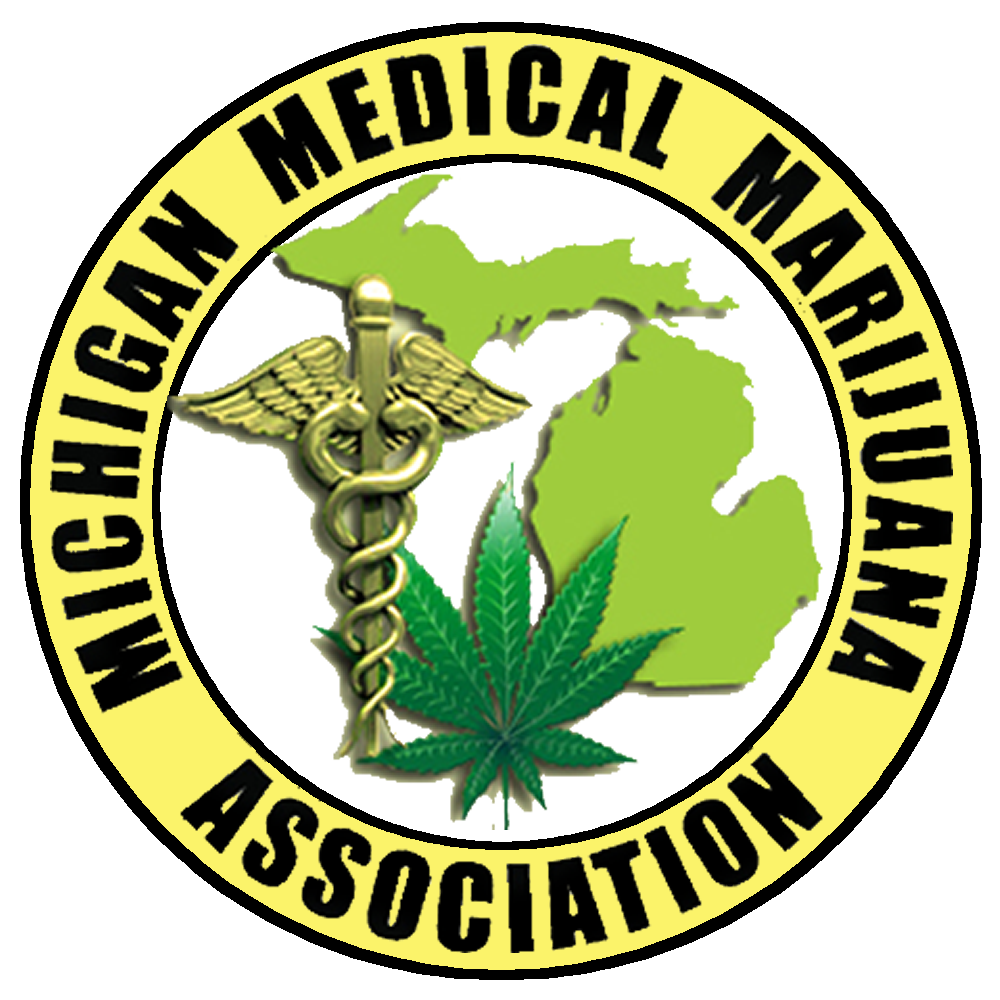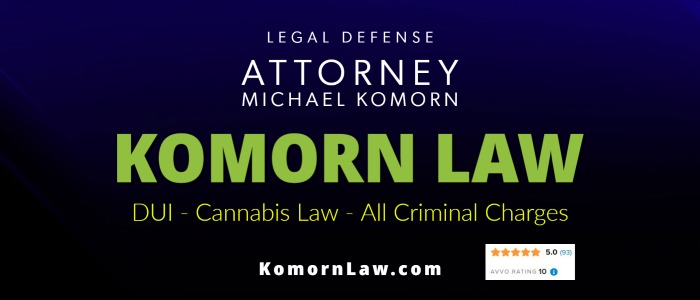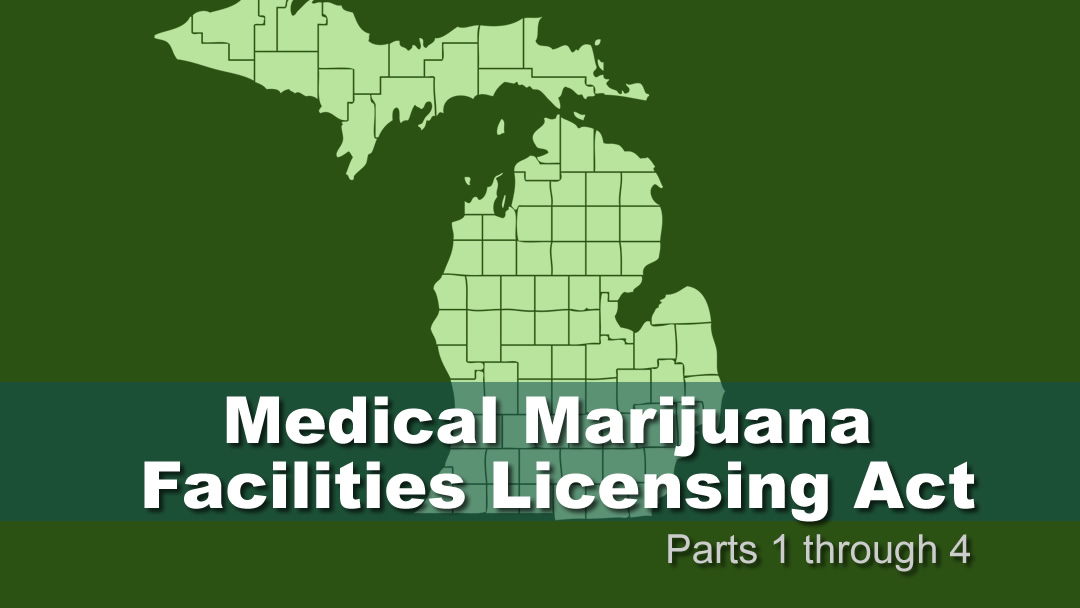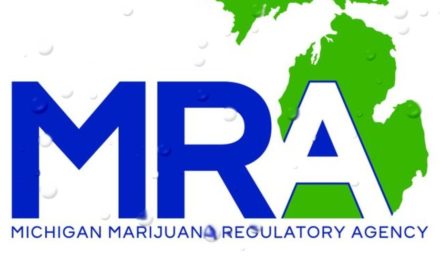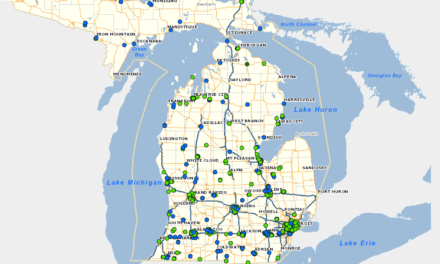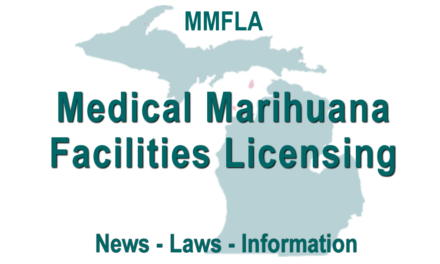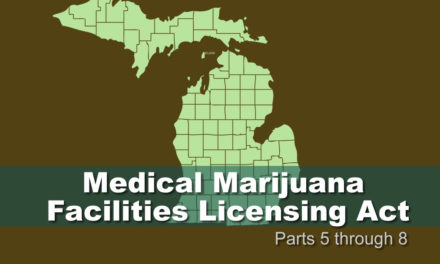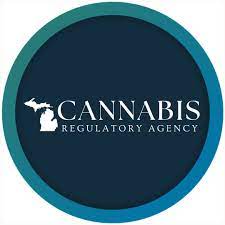MEDICAL MARIHUANA FACILITIES LICENSING ACT
Act 281 of 2016
PARTS 1 – 4
AN ACT to license and regulate medical marihuana growers, processors, provisioning centers, secure transporters, and safety compliance facilities; to provide for the powers and duties of certain state and local governmental officers and entities; to create a medical marihuana licensing board; to provide for interaction with the statewide monitoring system for commercial marihuana transactions; to create an advisory panel; to provide immunity from prosecution for marihuana-related offenses for persons engaging in certain activities in compliance with this act; to prescribe civil fines and sanctions and provide remedies; to provide for forfeiture of contraband; to provide for taxes, fees, and assessments; and to require the promulgation of rules.
History: 2016, Act 281, Eff. Dec. 20, 2016 ;– Am. 2018, Act 10, Imd. Eff. Jan. 26, 2018
Compiler’s Notes: Enacting section 2 of Act 281 of 2016 provides:”Enacting section 2. The legislature finds that the necessity for access to safe sources of marihuana for medical use and the immediate need for growers, processors, secure transporters, provisioning centers, and safety compliance facilities to operate under clear requirements establish the need to promulgate emergency rules to preserve the public health, safety, or welfare.”
© 2017 Legislative Council, State of Michigan
333.27101 Short title.
Sec. 101.
This act shall be known and may be cited as the “medical marihuana facilities licensing act”.
History: 2016, Act 281, Eff. Dec. 20, 2016
Compiler’s Notes: Enacting section 2 of Act 281 of 2016 provides:”Enacting section 2. The legislature finds that the necessity for access to safe sources of marihuana for medical use and the immediate need for growers, processors, secure transporters, provisioning centers, and safety compliance facilities to operate under clear requirements establish the need to promulgate emergency rules to preserve the public health, safety, or welfare.”
© 2017 Legislative Council, State of Michigan
333.27102 Definitions.
Sec. 102.
As used in this act:
(a) “Advisory panel” or “panel” means the marihuana advisory panel created in section 801.
(b) “Affiliate” means any person that controls, is controlled by, or is under common control with; is in a partnership or joint venture relationship with; or is a co-shareholder of a corporation, a co-member of a limited liability company, or a co-partner in a limited liability partnership with a licensee or applicant.
(c) “Applicant” means a person who applies for a state operating license. With respect to disclosures in an application, or for purposes of ineligibility for a license under section 402, the term applicant includes an officer, director, and managerial employee of the applicant and a person who holds any direct or indirect ownership interest in the applicant.
(d) “Board” means the medical marihuana licensing board created in section 301.
(e) “Cutting” means a section of a lead stem or root stock that is used for vegetative asexual propagation.
(f) “Department” means the department of licensing and regulatory affairs.
(g) “Grower” means a licensee that is a commercial entity located in this state that cultivates, dries, trims, or cures and packages marihuana for sale to a processor, provisioning center, or another grower.
(h) “Licensee” means a person holding a state operating license.
(i) “Marihuana” means that term as defined in section 7106 of the public health code, 1978 PA 368, MCL 333.7106.
(j) “Marihuana facility” means a location at which a licensee is licensed to operate under this act.
(k) “Marihuana plant” means any plant of the species Cannabis sativa L.
(l) “Marihuana-infused product” means a topical formulation, tincture, beverage, edible substance, or similar product containing any usable marihuana that is intended for human consumption in a manner other than smoke inhalation. Marihuana-infused product is not considered a food for purposes of the food law, 2000 PA 92, MCL 289.1101 to 289.8111.
(m) “Marihuana tracking act” means the marihuana tracking act, 2016 PA 282, MCL 333.27901 to 333.27904.
(n) “Michigan medical marihuana act” means the Michigan medical marihuana act, 2008 IL 1, MCL 333.26421 to 333.26430.
(o) “Municipality” means a city, township, or village.
(p) “Paraphernalia” means any equipment, product, or material of any kind that is designed for or used in growing, cultivating, producing, manufacturing, compounding, converting, storing, processing, preparing, transporting, injecting, smoking, ingesting, inhaling, or otherwise introducing into the human body, marihuana.
(q) “Person” means an individual, corporation, limited liability company, partnership, limited partnership, limited liability partnership, limited liability limited partnership, trust, or other legal entity.
(r) “Plant” means any living organism that produces its own food through photosynthesis and has observable root formation or is in growth material.
(s) “Processor” means a licensee that is a commercial entity located in this state that purchases marihuana from a grower and that extracts resin from the marihuana or creates a marihuana-infused product for sale and transfer in packaged form to a provisioning center or another processor.
(t) “Provisioning center” means a licensee that is a commercial entity located in this state that purchases marihuana from a grower or processor and sells, supplies, or provides marihuana to registered qualifying patients, directly or through the patients’ registered primary caregivers. Provisioning center includes any commercial property where marihuana is sold at retail to registered qualifying patients or registered primary caregivers. A noncommercial location used by a primary caregiver to assist a qualifying patient connected to the caregiver through the department’s marihuana registration process in accordance with the Michigan medical marihuana act is not a provisioning center for purposes of this act.
(u) “Registered primary caregiver” means a primary caregiver who has been issued a current registry identification card under the Michigan medical marihuana act.
(v) “Registered qualifying patient” means a qualifying patient who has been issued a current registry identification card under the Michigan medical marihuana act or a visiting qualifying patient as that term is defined in section 3 of the Michigan medical marihuana act, MCL 333.26423.
(w) “Registry identification card” means that term as defined in section 3 of the Michigan medical marihuana act, MCL 333.26423.
(x) “Rules” means rules promulgated under the administrative procedures act of 1969, 1969 PA 306, MCL 24.201 to 24.328, by the department in consultation with the board to implement this act.
(y) “Safety compliance facility” means a licensee that is a commercial entity that takes marihuana from a marihuana facility or receives marihuana from a registered primary caregiver, tests the marihuana for contaminants and for tetrahydrocannabinol and other cannabinoids, returns the test results, and may return the marihuana to the marihuana facility.
(z) “Secure transporter” means a licensee that is a commercial entity located in this state that stores marihuana and transports marihuana between marihuana facilities for a fee.
(aa) “Seed” means the fertilized, ungerminated, matured ovule, containing an embryo or rudimentary plant, of a marihuana plant that is flowering.
(bb) “Seedling” means a marihuana plant that has germinated and has not flowered and is not harvestable.
(cc) “State operating license” or, unless the context requires a different meaning, “license” means a license that is issued under this act that allows the licensee to operate as 1 of the following, specified in the license:
(i) A grower.
(ii) A processor.
(iii) A secure transporter.
(iv) A provisioning center.
(v) A safety compliance facility.
(dd) “Statewide monitoring system” or, unless the context requires a different meaning, “system” means an internet-based, statewide database established, implemented, and maintained by the department under the marihuana tracking act, that is available to licensees, law enforcement agencies, and authorized state departments and agencies on a 24-hour basis for all of the following:
(i) Verifying registry identification cards.
(ii) Tracking marihuana transfer and transportation by licensees, including transferee, date, quantity, and price.
(iii) Verifying in commercially reasonable time that a transfer will not exceed the limit that the patient or caregiver is authorized to receive under section 4 of the Michigan medical marihuana act, MCL 333.26424.
(ee) “Tissue culture” means a marihuana plant cell, cutting, tissue, or organ, that is kept under a sterile condition on a nutrient culture medium of known composition and that does not have visible root formation. A tissue culture is not a marihuana plant for purposes of a grower.
(ff) “Usable marihuana” means the dried leaves, flowers, plant resin, or extract of the marihuana plant, but does not include the seeds, stalks, and roots of the plant.
History: 2016, Act 281, Eff. Dec. 20, 2016 ;– Am. 2018, Act 10, Imd. Eff. Jan. 26, 2018
Compiler’s Notes: Enacting section 2 of Act 281 of 2016 provides:”Enacting section 2. The legislature finds that the necessity for access to safe sources of marihuana for medical use and the immediate need for growers, processors, secure transporters, provisioning centers, and safety compliance facilities to operate under clear requirements establish the need to promulgate emergency rules to preserve the public health, safety, or welfare.”
© 2017 Legislative Council, State of Michigan
———-
MEDICAL MARIHUANA FACILITIES LICENSING ACT (EXCERPT)
Act 281 of 2016
PART 2. APPLICATION OF OTHER LAWS
333.27201 Protected activities; person owning or leasing property upon which marihuana facility located subject to penalties or sanctions prohibited; conditions; activities of certified public accountant or financial institution not subject to certain penalties or sanctions; other provisions of law inconsistent with act; definitions.
Sec. 201.
(1) Except as otherwise provided in this act, if a person has been granted a state operating license and is operating within the scope of the license, the licensee and its agents are not subject to any of the following for engaging in activities described in subsection (2):
(a) Criminal penalties under state law or local ordinances regulating marihuana.
(b) State or local criminal prosecution for a marihuana-related offense.
(c) State or local civil prosecution for a marihuana-related offense.
(d) Search or inspection, except for an inspection authorized under this act by law enforcement officers, the municipality, or the department.
(e) Seizure of marihuana, real property, personal property, or anything of value based on a marihuana-related offense.
(f) Any sanction, including disciplinary action or denial of a right or privilege, by a business or occupational or professional licensing board or bureau based on a marihuana-related offense.
(2) The following activities are protected under subsection (1) if performed under a state operating license within the scope of that license and in accord with this act, rules, and any ordinance adopted under section 205:
(a) Growing marihuana.
(b) Purchasing, receiving, selling, transporting, or transferring marihuana from or to a licensee, a licensee’s agent, a registered qualifying patient, or a registered primary caregiver.
(c) Possessing marihuana.
(d) Possessing or manufacturing marihuana paraphernalia for medical use.
(e) Processing marihuana.
(f) Transporting marihuana.
(g) Testing, transferring, infusing, extracting, altering, or studying marihuana.
(h) Receiving or providing compensation for products or services.
(3) Except as otherwise provided in this act, a person who owns or leases real property upon which a marihuana facility is located and who has no knowledge that the licensee violated this act is not subject to any of the following for owning, leasing, or permitting the operation of a marihuana facility on the real property:
(a) Criminal penalties under state law or local ordinances regulating marihuana.
(b) State or local civil prosecution based on a marihuana-related offense.
(c) State or local criminal prosecution based on a marihuana-related offense.
(d) Search or inspection, except for an inspection authorized under this act by law enforcement officers, the municipality, or the department.
(e) Seizure of any real or personal property or anything of value based on a marihuana-related offense.
(f) Any sanction, including disciplinary action or denial of a right or privilege, by a business or occupational or professional licensing board or bureau.
(4) Except as otherwise provided in this act, a certified public accountant who is licensed under article 7 of the occupational code, 1980 PA 299, MCL 339.720 to 339.736, is not subject to any of the following for engaging in the practice of public accounting as that term is defined in section 720 of the occupational code, 1980 PA 299, MCL 339.720, for an applicant or licensee who is in compliance with this act, rules, and the Michigan medical marihuana act:
(a) Criminal penalties under state law or local ordinances regulating marihuana.
(b) State or local civil prosecution based on a marihuana-related offense.
(c) State or local criminal prosecution based on a marihuana-related offense.
(d) Seizure of any real or personal property or anything of value based on a marihuana-related offense.
(e) Any sanction, including disciplinary action or denial of a right or privilege, by a business or occupational or professional licensing board or bureau based on a marihuana-related offense.
(5) Except as otherwise provided in this act, a financial institution is not subject to any of the following for providing a financial service to a licensee under this act:
(a) Criminal penalties under state law or local ordinances regulating marihuana.
(b) State or local civil prosecution based on a marihuana-related offense.
(c) State or local criminal prosecution based on a marihuana-related offense.
(d) Seizure of any real or personal property or anything of value based on a marihuana-related offense.
(e) Any sanction, including disciplinary action or denial of a right or privilege, by a business or occupational or professional licensing board or bureau based on a marihuana-related offense.
(6) For the purposes of regulating the commercial entities established under this act, any provisions of the following acts that are inconsistent with this act do not apply to a grower, processor, secure transporter, provisioning center, or safety compliance facility operating in compliance with this act:
(a) The business corporation act, 1972 PA 284, MCL 450.1101 to 450.2098.
(b) The nonprofit corporation act, 1982 PA 162, MCL 450.2101 to 450.3192.
(c) 1931 PA 327, MCL 450.98 to 450.192.
(d) The Michigan revised uniform limited partnership act, 1982 PA 213, MCL 449.1101 to 449.2108.
(e) The Michigan limited liability company act, 1993 PA 23, MCL 450.4101 to 450.5200.
(f) 1907 PA 101, MCL 445.1 to 445.5.
(g) 1913 PA 164, MCL 449.101 to 449.106.
(h) The uniform partnership act, 1917 PA 72, MCL 449.1 to 449.48.
(7) As used in this section:
(a) “Financial institution” means any of the following:
(i) A state or national bank.
(ii) A state or federally chartered savings and loan association.
(iii) A state or federally chartered savings bank.
(iv) A state or federally chartered credit union.
(v) An insurance company.
(vi) An entity that offers any of the following to a resident of this state:
(A) A mutual fund account.
(B) A securities brokerage account.
(C) A money market account.
(D) A retail investment account.
(vii) An entity regulated by the Securities and Exchange Commission that collects funds from the public.
(viii) An entity that is a member of the National Association of Securities Dealers and that collects funds from the public.
(ix) Another entity that collects funds from the public.
(b) “Financial service” means a deposit; withdrawal; transfer between accounts; exchange of currency; loan; extension of credit; purchase or sale of any stock, bond, certificate of deposit, or other monetary instrument; or any other payment, transfer, or delivery by, through, or to a financial institution, by whatever means effected.
History: 2016, Act 281, Eff. Dec. 20, 2016 ;– Am. 2018, Act 10, Imd. Eff. Jan. 26, 2018
Compiler’s Notes: Enacting section 2 of Act 281 of 2016 provides:”Enacting section 2. The legislature finds that the necessity for access to safe sources of marihuana for medical use and the immediate need for growers, processors, secure transporters, provisioning centers, and safety compliance facilities to operate under clear requirements establish the need to promulgate emergency rules to preserve the public health, safety, or welfare.”
© 2017 Legislative Council, State of Michigan
333.27203 Registered qualifying patient or registered primary caregiver; criminal prosecution or sanctions prohibited; conditions.
Sec. 203.
A registered qualifying patient or registered primary caregiver is not subject to criminal prosecution or sanctions for purchasing marihuana from a provisioning center if the quantity purchased is within the limits established under the Michigan medical marihuana act. A registered primary caregiver is not subject to criminal prosecution or sanctions for any transfer of 2.5 ounces or less of marihuana to a safety compliance facility for testing.
History: 2016, Act 281, Eff. Dec. 20, 2016
Compiler’s Notes: Enacting section 2 of Act 281 of 2016 provides:”Enacting section 2. The legislature finds that the necessity for access to safe sources of marihuana for medical use and the immediate need for growers, processors, secure transporters, provisioning centers, and safety compliance facilities to operate under clear requirements establish the need to promulgate emergency rules to preserve the public health, safety, or welfare.”
© 2017 Legislative Council, State of Michigan
333.27204 Medical purpose defense.
Sec. 204.
This act does not limit the medical purpose defense provided in section 8 of the Michigan medical marihuana act, 2008 IL 1, MCL 333.26428, to any prosecution involving marihuana.
History: 2016, Act 281, Eff. Dec. 20, 2016
Compiler’s Notes: Enacting section 2 of Act 281 of 2016 provides:”Enacting section 2. The legislature finds that the necessity for access to safe sources of marihuana for medical use and the immediate need for growers, processors, secure transporters, provisioning centers, and safety compliance facilities to operate under clear requirements establish the need to promulgate emergency rules to preserve the public health, safety, or welfare.”
© 2017 Legislative Council, State of Michigan
333.27205 Marihuana facility; ordinance; requirements.
Sec. 205.
(1) The board shall not issue a state operating license to an applicant unless the municipality in which the applicant’s proposed marihuana facility will operate has adopted an ordinance that authorizes that type of facility. A municipality may adopt an ordinance to authorize 1 or more types of marihuana facilities within its boundaries and to limit the number of each type of marihuana facility. A municipality may adopt other ordinances relating to marihuana facilities within its jurisdiction, including zoning regulations, but shall not impose regulations regarding the purity or pricing of marihuana or interfering or conflicting with this act or rules for licensing marihuana facilities. A municipality that adopts an ordinance under this subsection that authorizes a marihuana facility shall provide the department with all of the following on a form prescribed and provided by the department:
(a) An attestation that the municipality has adopted an ordinance under this subsection that authorizes the marihuana facility.
(b) A description of any zoning regulations that apply to the proposed marihuana facility within the municipality.
(c) The signature of the clerk of the municipality or his or her designee.
(d) Any other information required by the department.
(2) A municipal ordinance may establish an annual, nonrefundable fee of not more than $5,000.00 to help defray administrative and enforcement costs associated with the operation of a marihuana facility in the municipality.
(3) The department may require a municipality to provide the following information to the department on a form prescribed and provided by the department regarding a licensee who submits an application for license renewal:
(a) Information that the board declares necessary to determine whether the licensee’s license should be renewed.
(b) A description of a violation of an ordinance or a zoning regulation adopted under subsection (1) committed by the licensee, but only if the violation relates to activities licensed under this act and rules or the Michigan medical marihuana act.
(c) Whether there has been a change to an ordinance or a zoning regulation adopted under subsection (1) since the license was issued to the licensee and a description of the change.
(4) Information a municipality obtains from an applicant under this section is exempt from disclosure under the freedom of information act, 1976 PA 442, MCL 15.231 to 15.246. Except as otherwise provided in this subsection, information a municipality provides to the department under this section is subject to disclosure under the freedom of information act, 1976 PA 442, MCL 15.231 to 15.246.
History: 2016, Act 281, Eff. Dec. 20, 2016 ;– Am. 2018, Act 10, Imd. Eff. Jan. 26, 2018
Compiler’s Notes: Enacting section 2 of Act 281 of 2016 provides:”Enacting section 2. The legislature finds that the necessity for access to safe sources of marihuana for medical use and the immediate need for growers, processors, secure transporters, provisioning centers, and safety compliance facilities to operate under clear requirements establish the need to promulgate emergency rules to preserve the public health, safety, or welfare.”
© 2017 Legislative Council, State of Michigan
333.27206 Rules.
Sec. 206.
The department, in consultation with the board, shall promulgate rules and emergency rules as necessary to implement, administer, and enforce this act. The rules must ensure the safety, security, and integrity of the operation of marihuana facilities, and must include rules to do the following:
(a) Set appropriate standards for marihuana facilities and associated equipment.
(b) Subject to section 408, establish minimum levels of insurance that licensees must maintain.
(c) Establish operating regulations for each category of license to ensure the health, safety, and security of the public and the integrity of marihuana facility operations.
(d) Establish qualifications and restrictions for persons participating in or involved with operating marihuana facilities.
(e) Establish testing standards, procedures, and requirements for marihuana sold through provisioning centers.
(f) Provide for the levy and collection of fines for a violation of this act or rules.
(g) Prescribe use of the statewide monitoring system to track all marihuana transfers, as provided in the marihuana tracking act and this act and provide for a funding mechanism to support the system.
(h) Establish quality control standards, procedures, and requirements for marihuana facilities.
(i) Establish chain of custody standards, procedures, and requirements for marihuana facilities.
(j) Establish standards, procedures, and requirements for waste product disposal and storage by marihuana facilities.
(k) Establish chemical storage standards, procedures, and requirements for marihuana facilities.
(l) Establish standards, procedures, and requirements for securely and safely transporting marihuana between marihuana facilities.
(m) Establish standards, procedures, and requirements for the storage of marihuana by marihuana facilities.
(n) Establish labeling and packaging standards, procedures, and requirements for marihuana sold or transferred through provisioning centers, including a prohibition on labeling or packaging that is intended to appeal to or has the effect of appealing to minors.
(o) Establish daily and monthly purchasing limits at provisioning centers for registered qualifying patients and registered primary caregivers to ensure compliance with the Michigan medical marihuana act.
(p) Establish marketing and advertising restrictions for marihuana products and marihuana facilities.
(q) Establish maximum tetrahydrocannabinol levels for marihuana-infused products sold or transferred through provisioning centers.
(r) Establish health standards to ensure the safe preparation of products containing marihuana that are intended for human consumption in a manner other than smoke inhalation.
(s) Establish restrictions on edible marihuana-infused products to prohibit shapes that would appeal to minors.
History: 2016, Act 281, Eff. Dec. 20, 2016 ;– Am. 2018, Act 10, Imd. Eff. Jan. 26, 2018
Compiler’s Notes: Enacting section 2 of Act 281 of 2016 provides:”Enacting section 2. The legislature finds that the necessity for access to safe sources of marihuana for medical use and the immediate need for growers, processors, secure transporters, provisioning centers, and safety compliance facilities to operate under clear requirements establish the need to promulgate emergency rules to preserve the public health, safety, or welfare.”
© 2017 Legislative Council, State of Michigan
333.27207 Third-party inventory control and tracking system.
Sec. 207.
A licensee shall adopt and use a third-party inventory control and tracking system that is capable of interfacing with the statewide monitoring system to allow the licensee to enter or access information in the statewide monitoring system as required under this act and rules. The third-party inventory control and tracking system must have all of the following capabilities necessary for the licensee to comply with the requirements applicable to the licensee’s license type:
(a) Tracking all marihuana plants, products, packages, patient and primary caregiver purchase totals, waste, transfers, conversions, sales, and returns that are linked to unique identification numbers.
(b) Tracking lot and batch information throughout the entire chain of custody.
(c) Tracking all products, conversions, and derivatives throughout the entire chain of custody.
(d) Tracking marihuana plant, batch, and product destruction.
(e) Tracking transportation of product.
(f) Performing complete batch recall tracking that clearly identifies all of the following details relating to the specific batch subject to the recall:
(i) Sold product.
(ii) Product inventory that is finished and available for sale.
(iii) Product that is in the process of transfer.
(iv) Product being processed into another form.
(v) Postharvest raw product, such as product that is in the drying, trimming, or curing process.
(g) Reporting and tracking loss, theft, or diversion of product containing marihuana.
(h) Reporting and tracking all inventory discrepancies.
(i) Reporting and tracking adverse patient responses or dose-related efficacy issues.
(j) Reporting and tracking all sales and refunds.
(k) Electronically receiving and transmitting information as required under this act, the Michigan medical marihuana act, 2008 IL 1, MCL 333.26421 to 333.26430, and the marihuana tracking act.
(l) Receiving testing results electronically from a safety compliance facility via a secured application program interface into the system and directly linking the testing results to each applicable source batch and sample.
(m) Identifying test results that may have been altered.
(n) Providing the licensee with access to information in the tracking system that is necessary to verify that the licensee is carrying out the marihuana transactions authorized under the licensee’s license in accordance with this act.
(o) Providing information to cross-check that product sales are made to a registered qualifying patient or a registered primary caregiver on behalf of a registered qualifying patient and that the product received the required testing.
(p) Providing the department and state agencies with access to information in the database that they are authorized to access.
(q) Providing law enforcement agencies with access to only the information in the database that is necessary to verify that an individual possesses a valid and current registry identification card.
(r) Providing licensees with access only to the information in the system that they are required to receive before a sale, transfer, transport, or other activity authorized under a license issued under this act.
(s) Securing the confidentiality of information in the database by preventing access by a person who is not authorized to access the statewide monitoring system or is not authorized to access the particular information.
(t) Providing analytics to the department regarding key performance indicators such as the following:
(i) Total daily sales.
(ii) Total marihuana plants in production.
(iii) Total marihuana plants destroyed.
(iv) Total inventory adjustments.
History: 2016, Act 281, Eff. Dec. 20, 2016
Compiler’s Notes: Enacting section 2 of Act 281 of 2016 provides:”Enacting section 2. The legislature finds that the necessity for access to safe sources of marihuana for medical use and the immediate need for growers, processors, secure transporters, provisioning centers, and safety compliance facilities to operate under clear requirements establish the need to promulgate emergency rules to preserve the public health, safety, or welfare.”
© 2017 Legislative Council, State of Michigan
333.27208 Marihuana facility and property; examination by local and state police.
Sec. 208.
A marihuana facility and all articles of property in that facility are subject to examination at any time by a local police agency or the department of state police.
History: 2016, Act 281, Eff. Dec. 20, 2016
Compiler’s Notes: Enacting section 2 of Act 281 of 2016 provides:”Enacting section 2. The legislature finds that the necessity for access to safe sources of marihuana for medical use and the immediate need for growers, processors, secure transporters, provisioning centers, and safety compliance facilities to operate under clear requirements establish the need to promulgate emergency rules to preserve the public health, safety, or welfare.”
© 2017 Legislative Council, State of Michigan
——
MEDICAL MARIHUANA FACILITIES LICENSING ACT (EXCERPT)
Act 281 of 2016
PART 3. MEDICAL MARIHUANA LICENSING BOARD
333.27301 Medical marihuana licensing board; creation; membership; appointment; terms; vacancy; reimbursement for expenses; other public office; eligibility; removal of member; executive director and other personnel; appointment and employment limitations; financial disclosure statement; direct or indirect interest.
Sec. 301.
(1) The medical marihuana licensing board is created within the department of licensing and regulatory affairs.
(2) The board consists of 5 members who are residents of this state, not more than 3 of whom are members of the same political party. The governor shall appoint the members. One of the members shall be appointed from 3 nominees submitted by the senate majority leader and 1 from 3 nominees submitted by the speaker of the house. The governor shall designate 1 of the members as chairperson.
(3) The members shall be appointed for terms of 4 years, except, of those who are first appointed, 1 member shall be appointed for a term of 2 years and 2 members shall be appointed for a term of 3 years. A member’s term expires on December 31 of the last year of the member’s term. If a vacancy occurs, the governor shall appoint a successor to fill the unexpired term in the manner of the original appointment.
(4) Each member of the board shall be reimbursed for all actual and necessary expenses and disbursements incurred in carrying out official duties.
(5) A board member shall not hold any other public office for which he or she receives compensation other than necessary travel or other incidental expenses.
(6) A person who is not of good moral character or who has been indicted for, charged with, or convicted of, pled guilty or nolo contendere to, or forfeited bail concerning any felony or a misdemeanor involving a controlled substance violation, theft, dishonesty, or fraud under the laws of this state, any other state, or the United States or a local ordinance in any state involving a controlled substance violation, dishonesty, theft, or fraud that substantially corresponds to a misdemeanor in that state is not eligible to serve on the board.
(7) The governor may remove any member of the board for neglect of duty, misfeasance, malfeasance, nonfeasance, or any other just cause.
(8) The department in conjunction with the board shall employ an executive director and other personnel as necessary to assist the board in carrying out its duties. The executive director shall devote his or her full time to the duties of the office and shall not hold any other office or employment.
(9) The board shall not appoint or employ an individual if any of the following circumstances exist:
(a) During the 3 years immediately preceding appointment or employment, the individual held any direct or indirect interest in, or was employed by, a person who is licensed to operate under this act or under a corresponding license in another jurisdiction or a person with an application for an operating license pending before the board or in any other jurisdiction. The board shall not employ an individual who has a direct or indirect interest in a licensee or a marihuana facility.
(b) The individual or his or her spouse, parent, child, child’s spouse, sibling, or spouse of a sibling has an application for a license pending before the board or is a member of the board of directors of, or an individual financially interested in, any licensee or marihuana facility.
(10) Each member of the board, the executive director, and each key employee as determined by the department shall file with the governor a financial disclosure statement listing all assets and liabilities, property and business interests, and sources of income of the member, executive director, and key employee and his or her spouse, if any, affirming that the member, executive director, and key employee are in compliance with subsection (9)(a) and (b). The financial disclosure statement shall be made under oath and filed at the time of employment and annually thereafter.
(11) Each employee of the board shall file with the board a financial disclosure statement listing all assets and liabilities, property and business interests, and sources of income of the employee and his or her spouse. This subsection does not apply to the executive director or a key employee.
(12) A member of the board, executive director, or key employee shall not hold any direct or indirect interest in, be employed by, or enter into a contract for services with an applicant, a board licensee, or a marihuana facility for a period of 4 years after the date his or her employment or membership on the board terminates. The department in consultation with the board shall define the term “direct or indirect interest” by rule.
(13) For 2 years after the date his or her employment with the board is terminated, an employee of the board shall not acquire any direct or indirect interest in, be employed by, or enter into a contract for services with any applicant, licensee, or marihuana facility.
(14) For 2 years after the termination of his or her office or employment with the board, a board member or an individual employed by the board shall not represent any person or party other than this state before or against the board.
(15) A business entity in which a former board member or employee or agent has an interest, or any partner, officer, or employee of the business entity, shall not make any appearance or represent a party that the former member, employee, or agent is prohibited from appearing for or representing. As used in this subsection, “business entity” means a corporation, limited liability company, partnership, limited liability partnership, association, trust, or other form of legal entity.
History: 2016, Act 281, Eff. Dec. 20, 2016
Compiler’s Notes: Enacting section 2 of Act 281 of 2016 provides:”Enacting section 2. The legislature finds that the necessity for access to safe sources of marihuana for medical use and the immediate need for growers, processors, secure transporters, provisioning centers, and safety compliance facilities to operate under clear requirements establish the need to promulgate emergency rules to preserve the public health, safety, or welfare.”
© 2017 Legislative Council, State of Michigan
333.27302 Board; duties.
Sec. 302.
The board has general responsibility for implementing this act. The board has the powers and duties specified in this act and all other powers necessary and proper to fully and effectively implement and administer this act for the purpose of licensing, regulating, and enforcing the licensing and regulation system established under this act for marihuana growth, processing, testing, and transporting. The board is subject to the administrative procedures act of 1969, 1969 PA 306, MCL 24.201 to 24.328. The board’s duties include all of the following:
(a) Granting or denying each application for a state operating license within a reasonable time.
(b) Deciding all license applications in reasonable order.
(c) Conducting its public meetings in compliance with the open meetings act, 1976 PA 267, MCL 15.231 to 15.246.
(d) Consulting with the department in promulgating rules and emergency rules as necessary to implement, administer, and enforce this act. The board shall not promulgate a rule establishing a limit on the number or type of marihuana facility licenses that may be granted.
(e) Implementing and collecting the application fee described in section 401 and, in conjunction with the department of treasury, the tax described in section 601 and regulatory assessment described in section 603.
(f) Providing for the levy and collection of fines for a violation of this act or rules.
(g) Providing oversight of a marihuana facility through the board’s inspectors, agents, and auditors and through the state police or attorney general for the purpose of certifying the revenue, receiving complaints from the public, or conducting investigations into the operation of the marihuana facility as the board considers necessary and proper to ensure compliance with this act and rules and to protect and promote the overall safety, security, and integrity of the operation of a marihuana facility.
(h) Providing oversight of marihuana facilities to ensure that marihuana-infused products meet health and safety standards that protect the public to a degree comparable to state and federal standards applicable to similar food and drugs.
(i) Reviewing and ruling on any complaint by a licensee regarding any investigative procedures of this state that are believed to be unnecessarily disruptive of marihuana facility operations. The need to inspect and investigate is presumed at all times. The board may delegate authority to hear, review, or rule on licensee complaints to a subcommittee of the board. To prevail on the complaint, a licensee must establish by a preponderance of the evidence that the procedures unreasonably disrupted its marihuana facility operations.
(j) Holding at least 2 public meetings each year. Upon 72 hours’ written notice to each member, the chairperson or any 2 board members may call a special meeting. Three members of the board constitute a quorum, including when making determinations on an application for a license. Three votes are required in support of final determinations of the board on applications for licenses and all other licensing determinations, except that 4 votes are required in support of a determination to suspend or revoke a license. The board shall keep a complete and accurate record of all of its meetings and hearings. Upon order of the board, 1 of the board members or a hearing officer designated by the board may conduct any hearing provided for under this act or by rules and may recommend findings and decisions to the board. The board member or hearing officer conducting the hearing has all powers and rights regarding the conduct of hearings granted to the board under this act. The record made at the time of the hearing shall be reviewed by the board or a majority of the board, and the findings and decision of the majority of the board are the order of the board in the case.
(k) Maintaining records that are separate and distinct from the records of any other state board. The records shall be made available for public inspection subject to the limitations of this act and shall accurately reflect all board proceedings.
(l) Reviewing the patterns of marihuana transfers by the licensees under this act as recorded in a statewide database established for use in administering and enforcing this act and making recommendations to the governor and the legislature in a written annual report to the governor and the legislature and additional reports that the governor requests. The annual report shall be submitted by April 15 of each year and shall include the report required under section 702, a statement of receipts and disbursements by the board, the actions taken by the board, and any additional information and recommendations that the board considers appropriate or that the governor requests.
(m) Except as otherwise provided in this act, all information, records, interviews, reports, statements, memoranda, or other data supplied to or used by the board are subject to the freedom of information act, 1976 PA 442, MCL 15.231 to 15.246, except for the following:
(i) Unless presented during a public hearing or requested by the licensee or applicant who is the sole subject of the data, all of the information, records, interviews, reports, statements, memoranda, or other data supplied to, created by, or used by the board related to background investigation of applicants or licensees and to trade secrets, internal controls, and security measures of the licensees or applicants.
(ii) All information, records, interviews, reports, statements, memoranda, or other data supplied to or used by the board that have been received from another jurisdiction or local, state, or federal agency under a promise of confidentiality or if the release of the information is otherwise barred by the statutes, rules, or regulations of that jurisdiction or agency or by an intergovernmental agreement.
(iii) All information in the statewide monitoring system.
History: 2016, Act 281, Eff. Dec. 20, 2016
Compiler’s Notes: Enacting section 2 of Act 281 of 2016 provides:”Enacting section 2. The legislature finds that the necessity for access to safe sources of marihuana for medical use and the immediate need for growers, processors, secure transporters, provisioning centers, and safety compliance facilities to operate under clear requirements establish the need to promulgate emergency rules to preserve the public health, safety, or welfare.”
© 2017 Legislative Council, State of Michigan
333.27303 Board; powers.
Sec. 303.
(1) The board has jurisdiction over the operation of all marihuana facilities. The board has all powers necessary and proper to fully and effectively oversee the operation of marihuana facilities, including the authority to do all of the following:
(a) Investigate applicants for state operating licenses, determine the eligibility for licenses, and grant licenses to applicants in accordance with this act and the rules.
(b) Investigate all individuals employed by marihuana facilities.
(c) At any time, through its investigators, agents, auditors, or the state police, without a warrant and without notice to the licensee, enter the premises, offices, facilities, or other places of business of a licensee, if evidence of compliance or noncompliance with this act or rules is likely to be found and consistent with constitutional limitations, for the following purposes:
(i) To inspect and examine all premises of marihuana facilities.
(ii) To inspect, examine, and audit relevant records of the licensee and, if the licensee fails to cooperate with an investigation, impound, seize, assume physical control of, or summarily remove from the premises all books, ledgers, documents, writings, photocopies, correspondence, records, and videotapes, including electronically stored records, money receptacles, or equipment in which the records are stored.
(iii) To inspect the person, and inspect or examine personal effects present in a marihuana facility, of any holder of a state operating license while that person is present in a marihuana facility.
(iv) To investigate alleged violations of this act or rules.
(d) Investigate alleged violations of this act or rules and take appropriate disciplinary action against a licensee.
(e) Consult with the department in adopting rules to establish appropriate standards for marihuana facilities and associated equipment.
(f) Require all relevant records of licensees, including financial or other statements, to be kept on the premises authorized for operation of the marihuana facility of the licensee or in the manner prescribed by the board.
(g) Require that each licensee of a marihuana facility submit to the board a list of the stockholders or other persons having a 1% or greater beneficial interest in the facility in addition to any other information the board considers necessary to effectively administer this act and rules, orders, and final decisions made under this act.
(h) Eject, or exclude or authorize the ejection or exclusion of, an individual from a marihuana facility if the individual violates this act, rules, or final orders of the board. However, the propriety of the ejection or exclusion is subject to a subsequent hearing by the board.
(i) Conduct periodic audits of marihuana facilities licensed under this act.
(j) Consult with the department as to appropriate minimum levels of insurance for licensees in addition to the minimum established under section 408 for liability insurance.
(k) Delegate the execution of any of its powers that are not specifically and exclusively reserved to the board under this act for the purpose of administering and enforcing this act and rules.
(l) Take disciplinary action as the board considers appropriate to prevent practices that violate this act and rules.
(m) Review a licensee if that licensee is under review or the subject of discipline by a regulatory body in any other jurisdiction for a violation of a controlled substance or marihuana law or regulation in that jurisdiction.
(n) Take any other reasonable or appropriate action to enforce this act and rules.
(2) The board may seek and shall receive the cooperation and assistance of the department of state police in conducting background investigations of applicants and in fulfilling its responsibilities under this act. The department of state police may recover its costs of cooperation under this subsection.
History: 2016, Act 281, Eff. Dec. 20, 2016
Compiler’s Notes: Enacting section 2 of Act 281 of 2016 provides:”Enacting section 2. The legislature finds that the necessity for access to safe sources of marihuana for medical use and the immediate need for growers, processors, secure transporters, provisioning centers, and safety compliance facilities to operate under clear requirements establish the need to promulgate emergency rules to preserve the public health, safety, or welfare.”
© 2017 Legislative Council, State of Michigan
333.27305 Board; disclosure form; providing certain notices to chairperson; ex parte communication; outside employment; personal transaction involving marihuana with licensee or applicant; violation.
Sec. 305.
(1) By January 31 of each year, each member of the board shall prepare and file with the governor’s office and the board a disclosure form in which the member does all of the following:
(a) Affirms that the member or the member’s spouse, parent, child, or child’s spouse is not a member of the board of directors of, financially interested in, or employed by a licensee or applicant.
(b) Affirms that the member continues to meet any other criteria for board membership under this act or the rules promulgated by the board.
(c) Discloses any legal or beneficial interests in any real property that is or that may be directly or indirectly involved with operations authorized by this act.
(d) Discloses any other information as may be required to ensure that the integrity of the board and its work is maintained.
(2) By January 31 of each year, each employee of the board shall prepare and file with the board an employee disclosure form in which the employee does all of the following:
(a) Affirms the absence of financial interests prohibited by this act.
(b) Discloses any legal or beneficial interests in any real property that is or that may be directly or indirectly involved with operations authorized by this act.
(c) Discloses whether the employee or the employee’s spouse, parent, child, or child’s spouse is financially interested in or employed by a licensee or an applicant for a license under this act.
(d) Discloses such other matters as may be required to ensure that the integrity of the board and its work is maintained.
(3) A member, employee, or agent of the board who becomes aware that the member, employee, or agent of the board or his or her spouse, parent, or child is a member of the board of directors of, financially interested in, or employed by a licensee or an applicant shall immediately provide detailed written notice thereof to the chairperson.
(4) A member, employee, or agent of the board who within the previous 10 years has been indicted for, charged with, or convicted of, pled guilty or nolo contendere to, or forfeited bail concerning a misdemeanor involving controlled substances, dishonesty, theft, or fraud or a local ordinance in any state involving controlled substances, dishonesty, theft, or fraud that substantially corresponds to a misdemeanor in that state, or a felony under Michigan law, the laws of any other state, or the laws of the United States or any other jurisdiction shall immediately provide detailed written notice of the conviction or charge to the chairperson.
(5) Any member, employee, or agent of the board who is negotiating for, or acquires by any means, any interest in any person who is a licensee or an applicant, or any person affiliated with such a person, shall immediately provide written notice of the details of the interest to the chairperson. The member, employee, or agent of the board shall not act on behalf of the board with respect to that person.
(6) A member, employee, or agent of the board shall not enter into any negotiations for employment with any person or affiliate of any person who is a licensee or an applicant and shall immediately provide written notice of the details of any such negotiations or discussions in progress to the chairperson. The member, employee, or agent of the board shall not take action on behalf of the board with respect to that person.
(7) Any member, employee, or agent of the board who receives an invitation, written or oral, to initiate a discussion concerning employment or the possibility of employment with a person or affiliate of a person who is a licensee or an applicant shall immediately report that he or she received the invitation to the chairperson. The member, employee, or agent of the board shall not take action on behalf of the board with respect to the person.
(8) A licensee or applicant shall not knowingly initiate a negotiation for or discussion of employment with a member, employee, or agent of the board. A licensee or applicant who initiates a negotiation or discussion about employment shall immediately provide written notice of the details of the negotiation or discussion to the chairperson as soon as he or she becomes aware that the negotiation or discussion has been initiated with a member, employee, or agent of the board.
(9) A member, employee, or agent of the board, or former member, employee, or agent of the board, shall not disseminate or otherwise disclose any material or information in the possession of the board that the board considers confidential unless specifically authorized to do so by the chairperson or the board.
(10) A member, employee, or agent of the board or a parent, spouse, sibling, spouse of a sibling, child, or spouse of a child of a member, employee, or agent of the board shall not accept any gift, gratuity, compensation, travel, lodging, or anything of value, directly or indirectly, from any licensee or any applicant or affiliate or representative of a licensee or applicant, unless the acceptance conforms to a written policy or directive that is issued by the chairperson or the board. Any member, employee, or agent of the board who is offered or receives any gift, gratuity, compensation, travel, lodging, or anything of value, directly or indirectly, from any licensee or any applicant or affiliate or representative of an applicant or licensee shall immediately provide written notification of the details to the chairperson.
(11) A licensee or applicant, or an affiliate or representative of an applicant or licensee, shall not, directly or indirectly, give or offer to give any gift, gratuity, compensation, travel, lodging, or anything of value to any member, employee, or agent of the board that the member, employee, or agent of the board is prohibited from accepting under subsection (10).
(12) A member, employee, or agent of the board shall not engage in any conduct that constitutes a conflict of interest and shall immediately advise the chairperson in writing of the details of any incident or circumstances that would present the existence of a conflict of interest with respect to performing board-related work or duties.
(13) A member, employee, or agent of the board who is approached and offered a bribe as described in section 118 of the Michigan penal code, 1931 PA 328, MCL 750.118, or this act shall immediately provide written account of the details of the incident to the chairperson and to a law enforcement officer of a law enforcement agency having jurisdiction.
(14) A member, employee, or agent of the board shall disclose his or her past involvement with any marihuana enterprise in the past 5 years and shall not engage in political activity or politically related activity during the duration of his or her appointment or employment.
(15) A former member, employee, or agent of the board may appear before the board as a fact witness about matters or actions handled by the member, employee, or agent during his or her tenure as a member, employee, or agent of the board. The member, employee, or agent of the board shall not receive compensation for such an appearance other than a standard witness fee and reimbursement for travel expenses as established by statute or court rule.
(16) A licensee or applicant or any affiliate or representative of an applicant or licensee shall not engage in ex parte communications with a member of the board. A member of the board shall not engage in any ex parte communications with a licensee or an applicant or with any affiliate or representative of an applicant or licensee.
(17) Any board member, licensee, or applicant or affiliate or representative of a board member, licensee, or applicant who receives any ex parte communication in violation of subsection (16), or who is aware of an attempted communication in violation of subsection (16), shall immediately report details of the communication or attempted communication in writing to the chairperson.
(18) Any member of the board who receives an ex parte communication in an attempt to influence that member’s official action shall disclose the source and content of the communication to the chairperson. The chairperson may investigate or initiate an investigation of the matter with the assistance of the attorney general and state police to determine if the communication violates subsection (16) or subsection (17) or other state law. The disclosure under this section and the investigation are confidential. Following an investigation, the chairperson shall advise the governor or the board, or both, of the results of the investigation and may recommend action as the chairperson considers appropriate. If the chairperson receives such an ex parte communication, he or she shall report the communication to the governor’s office for appropriate action.
(19) A new or current employee or agent of the board shall obtain written permission from the executive director before continuing outside employment held at the time the employee begins to work for the board. Permission shall be denied, or permission previously granted shall be revoked, if the executive director considers the nature of the work to create a possible conflict of interest or if it would otherwise interfere with the duties of the employee or agent for the board.
(20) An employee or agent of the board granted permission for outside employment shall not conduct any business or perform any activities, including solicitation, related to outside employment on premises used by the board or during the employee’s working hours for the board.
(21) The chairperson shall report any action he or she has taken or proposes to take under this section with respect to an employee or agent or former employee or former agent to the board at the next meeting of the board. The board may direct the executive director to take additional or different action.
(22) Except as allowed under the Michigan medical marihuana act, a member, employee, or agent of the board shall not enter into any personal transaction involving marihuana with a licensee or applicant.
(23) If a licensee or applicant, or an affiliate or representative of a licensee or applicant, violates this section, the board may deny a license application, revoke or suspend a license, or take other disciplinary action as provided in section 407.
(24) Violation of this section by a member of the board may result in disqualification or constitute cause for removal under section 301(7) or other disciplinary action as recommended by the board to the governor.
(25) A violation of this section by an employee or agent of the board need not result in termination of employment if the board determines that the conduct involved does not violate the purpose of this act. However, all of the following apply:
(a) If, after being offered employment or beginning employment with the board, the employee or agent intentionally acquires a financial interest in a licensee or an applicant, or an affiliate or representative of a licensee or applicant, the offer or employment with the board shall be terminated.
(b) If a financial interest in a licensee or an applicant, or an affiliate or representative of a licensee or applicant, is acquired by an employee or agent that has been offered employment with the board, an employee of the board, or the employee’s or agent’s spouse, parent, or child, through no intentional action of the employee or agent, the individual shall have up to 30 days to divest or terminate the financial interest. Employment may be terminated if the interest has not been divested after 30 days.
(c) Employment shall be terminated if the employee or agent is a spouse, parent, child, or spouse of a child of a board member.
(26) Violation of this section does not create a civil cause of action.
(27) As used in this section:
(a) “Outside employment”, in addition to employment by a third party, includes, but is not limited to, the following:
(i) Operation of a proprietorship.
(ii) Participation in a partnership or group business enterprise.
(iii) Performance as a director or corporate officer of any for-profit or nonprofit corporation or banking or credit institution.
(iv) Performance as a manager of a limited liability company.
(b) “Political activity” or “politically related activity” includes all of the following:
(i) Using his or her official authority or influence for the purpose of interfering with or affecting the result of an election.
(ii) Knowingly soliciting, accepting, or receiving a political contribution from any person.
(iii) Running for the nomination or as a candidate for election to a partisan political office.
(iv) Knowingly soliciting or discouraging the participation in any political activity of any person who is either of the following:
(A) Applying for any compensation, grant, contract, ruling, license, permit, or certificate pending before the board.
(B) The subject of or a participant in an ongoing audit, investigation, or enforcement action being carried out by the board.
History: 2016, Act 281, Eff. Dec. 20, 2016
Compiler’s Notes: Enacting section 2 of Act 281 of 2016 provides:”Enacting section 2. The legislature finds that the necessity for access to safe sources of marihuana for medical use and the immediate need for growers, processors, secure transporters, provisioning centers, and safety compliance facilities to operate under clear requirements establish the need to promulgate emergency rules to preserve the public health, safety, or welfare.”
© 2017 Legislative Council, State of Michigan
PARTS 5 through 7
For over 25 years Komorn Law has succesfully defended clients charged or arrested for criminal offenses for drugged driving, DUI, Marijuana, CCE, Conspiricy and more. Read client reviews here on AVVO.
